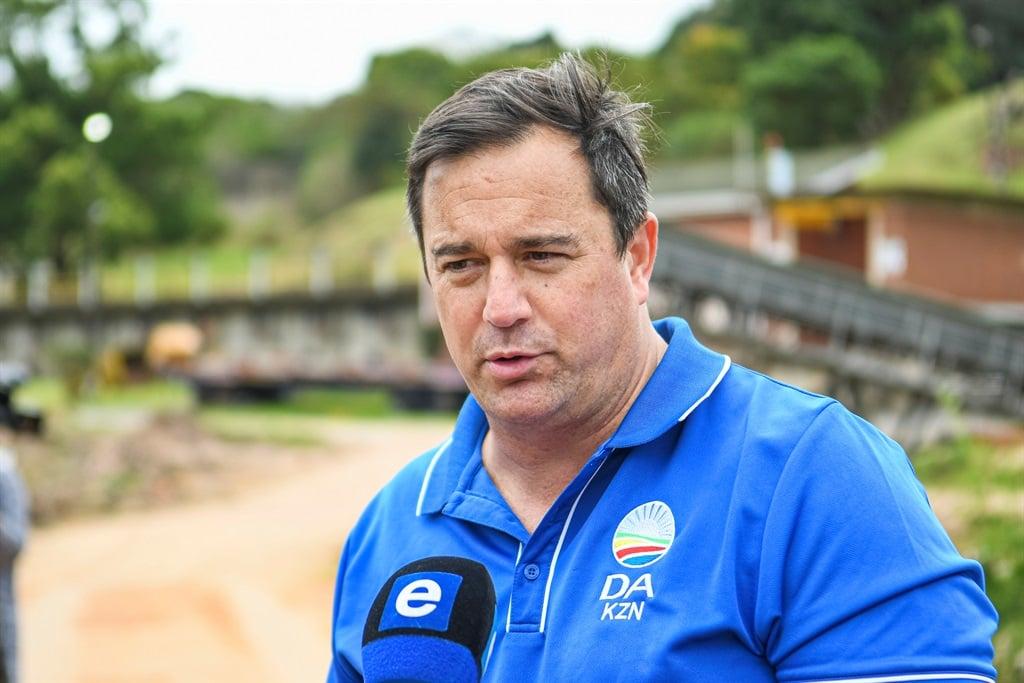
Africa-Press – South-Africa. John Steenhuisen’s campaign for re-election as DA leader received a boost on Saturday as the party’s Gauteng leaders threw their weight behind him, labelling him “the best candidate” to take the DA into the 2024 elections.
DA Gauteng leader Solly Msimanga and provincial chairperson Fred Nel sang Steenhuisen’s praises, saying he had navigated the DA through murky waters such as when former leader Mmusi Maimane vacated his post as party leader.
Other leaders praised his efforts during, among others, the party’s struggle with race relations.
Msimanga said, “I have worked with him during a very difficult time in the last two years where we were trying to keep the ship from sinking and keep it steady.”
“We were instilling the values that this is not about the organisation but the country. I am here to tell you that he has been able to steady the ship; I am here to tell you that he is getting my vote and endorsement, and he is able to get us to 2024 and to get us to victory. He is the right man for the job,” said Msimanga.
Nel, in a veiled attack at Maimane, said entrusting leaders who did not grow up in the party and have been indoctrinated in party values had backfired in the past, and Steenhuisen was the best candidate given that he grew up in the DA.
On Saturday, Steenhuisen launched his manifesto for re-election at Yia Yia’s Kitchen, a restaurant in Bedfordview, Johannesburg.
The cosy establishment was packed to the brim with the two aforementioned Gauteng leaders amongst a host of party leaders from Johannesburg, Tshwane, and Ekurhuleni who had come to make their support for Steenhuisen known.
Steenhuisen chose to launch his campaign in his competitor, former Johannesburg mayor Mpho Phalatse’s backyard.
Phalatse is one of the few party leaders who has put her hand up to contest the DA leader for the party’s top position when the official opposition holds its elective congress in April.
Steenhuisen’s endorsement by the Gauteng leadership follows hot on the heels of backing by the party’s leadership in the Free State, Eastern Cape and KwaZulu-Natal.
This places him in a ripe position for retaining the job during a time when the DA is facing serious internal challenges, with a host of black leaders have thrown in the towel, citing race relations struggles in the organisation.
Of late, the DA has also lost out on the governance of metros in Gauteng to coalitions led by the ANC and the EFF.
On the issue of race relations, Msimanga said, “the sad part is when people say because I am a black person, then it has to be about the politics of race again.”
“I have been adamant that, not in this party. In the DA, you put your ideas across and let them be the ones that either get you elected or not,” said Msimang.
The emboldened Steenhuisen said he chose to launch his campaign in Gauteng because it “would, following the 2024 elections, be the next province to be governed by the DA.
He added that after a period of consolidation going into 2021, his vision for the DA was now ambitious and entailed the DA playing a leading role in constructing a post-ANC South Africa.
“The DA is back on the right track. After three years of painstakingly rebuilding the internal process and repositioning the DA’s brand as the only realistic solution for the issues voters care about most, we are now within striking distance of a historic achievement: leading national government next year,” said Steenhuisen.
He added that when he joined the DA’s predecessor, the Democratic Party, in 1997, he was not under any illusions about the difficulties that lay ahead.
“We were a 1.7% party; today, I can confidently report that our three decades of patient, persistent hard work has paid off.
“It is through generations of hard work that we have arrived at a point where we are now only 10% behind the ANC,” said the DA leader.
He said, among other things, his pledges were “making history by getting the ANC under 50% nationally and ensuring the DA is the only alternative”.
Steenhuisen also said he wanted to focus the DA’s communication on addressing issues that matter most to voters, such as; “ending load-shedding, embracing the private sector in an attempt to reduce unemployment below 20%, defeating cadre deployment corruption and building a capable state to improve education and healthcare.”
He was adamant that under his leadership, he wanted to halve violent crime; and devolve more powers over electricity generation, public transport, and policing to “capable local governments”.
For More News And Analysis About South-Africa Follow Africa-Press





